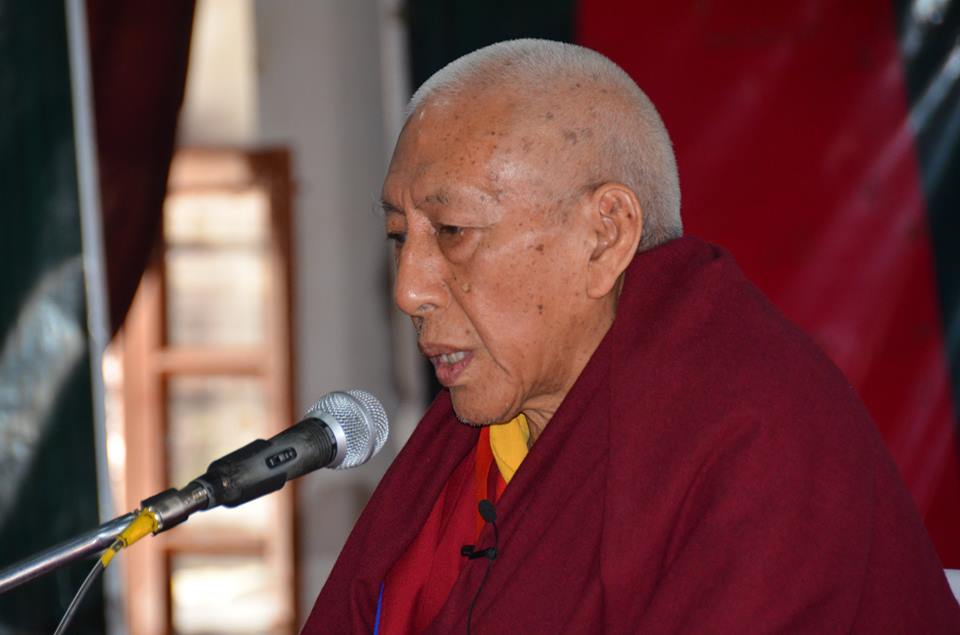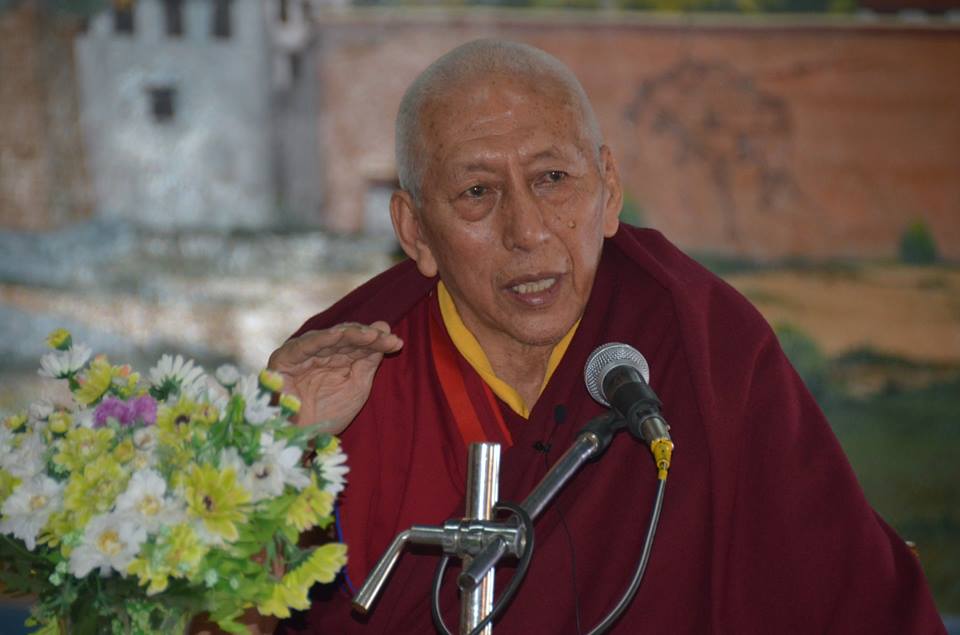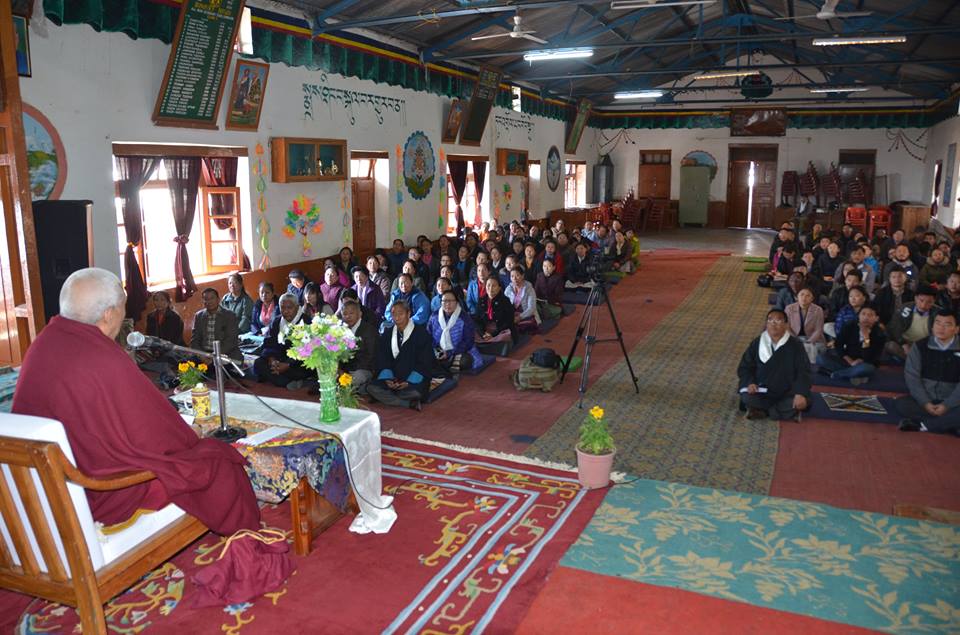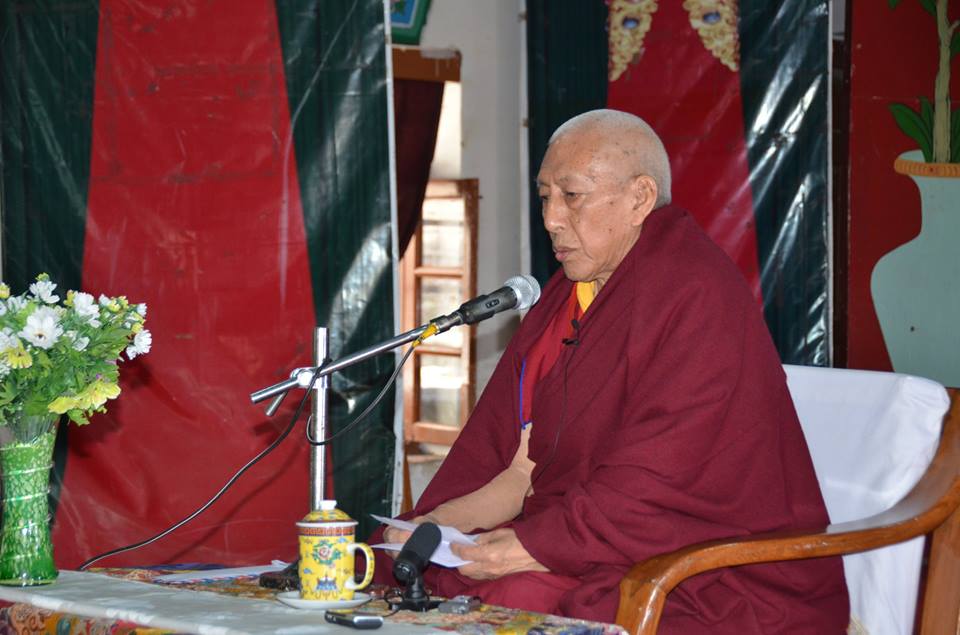A guidance talk on Secular Ethics
On the morning of 6 March 2017, His Eminence Prof. Samdhong Rinpoche gave a guidance talk on the requested topic of Secular Ethics, to the teachers and staff members of Tibetan Children’s Village School, Upper Dharamshala, at the commencement of academic year’s orientation function.
Prior to the talk, Mr. Ngodup Wangdu, the Director of the school, gave an introduction. Thereafter His Eminence Prof. Samdhong Rinpoche began the guidance talk by extending greetings of the Tibetan New Year, and prayers for progress in Tibetan education.
His Eminence Rinpoche then remarked, “Tibetan Children’s Village gives me frequent opportunity to give talks. In general, in terms of my age and works, I have become [a part of] old generation, to be faded from the society’s memory, and the time has come for those of the new generation to take responsibilities. As such, unless it is a spiritual matter in the Tibetan society, I try not having to be involved much. Yet, since there is much expectation being put from the school here, it happens that I am here again and again. I have nothing new to say.”
His Eminence Rinpoche continued, “Organised on the occasion of the school’s new academic year starting today, for the day’s Orientation Function, you have written “To carry one’s duties through secular ethics” as the topic of the talk. Of the numerous instructive advice given by His Holiness the Fourteenth Dalai Lama, that are beneficial to world at large, those on Secular Ethics, and Universal Responsibility, are especially held in high regard and greatly admired internationally. ‘Universal Responsibility’ advice by His Holiness was initially given during 1970’s when His Holiness began travelling to Western countries. So many were people in the West who took the advice, did research on it, and practised it.
“His Holiness slightly touched upon ‘Secular Ethics’ in the early 1990’s; mainly His Holiness started advising on it at the start of the new millennium, the beginning of the Twenty-first Century. These two instructive advice have been much admired and respected by people with intellect, and seeing that these advice are especially needed at present, researches on them, in Western universities, and implementation, are ongoing. Yet, from what I see it appears that there has not been that much interest in them in the Tibetan society.
“Since ‘Secular Ethics’ is a vast system of insight, it would not be possible to talk about it in a short time frame. I will try to present a framework of it.”
His Eminence continued, “The reason for saying ‘Secular Ethics’ (ethics not related with religion; ethics not related with religious influence and bias) is because at present there are various problems and conflicts in the world, of which most have come about due to decline in human ethics. As such, His Holiness’ thinking of improvement in ethics in general.”
His Eminence Prof. Samdhong Rinpoche presented the insights: After the separation of religion and politics (‘separation of the church and the state’) the responsibility as regards ethics became as if not incumbent on the religious systems; also in the secular countries where religious guidance and ethics guidance are done without, there gradually came about the situation of objecting to teaching of religions in schools; not only that, as if like a second part [of the reason], with decline of the individual religious systems there arose the situation where those who practise exactly as what is instructed in one’s religious system became rare; for us Buddhists, for instance, although we daily recite, “To the Enlightened Ones, the Teachings, and the Supreme Congregation/ I go for refuge until attaining enlightenment/” and so forth, yet if it is asked whether our behaviour in life actually concords with the precepts of Going for Refuge, Altruistic Enlightenment Mind, or concordant with the Teachings, it would be very difficult to respond in the affirmative; even those who have taken the vows to abide by the five-precepts training, we see for ourselves that they do not observe even one precept; thus, since what are said in the Teachings and the absence of practice/implementation from the part of a person have become contradictory, the situation has so become where the presentation of spiritual ethics could not serve the world in general.
His Eminence Rinpoche further pointed out: Even if religious ethics are taken up, it would be difficult to have a uniform guideline of religious ethics, because there are many variant religious systems. At World Parliament of Religions, convened in Chicago, the United States, in 1997, a committee consisting of over 60 religious heads deliberated for two days, for the need to have a Universal Declaration of Human Duties, as per the existing Universal Declaration of Human Rights, but the agenda did not come into fruition; for example, with non-violence, it becomes difficult to bring it 100% into Ethics, because of individual religious systems’ way of thinking as regards non-violence; thus, since each religious system has variant Ethics, they do not become uniformly entailing; and, in particular, of the 7 billion human population at present in this world, a certain percentage of that are people who do not believe in religion; so, unless there is a situation of Secular Ethics prevailing, if, instead the Ethics is solely to be that of religious systems, then to tell others to practise—while one does not practise so oneself—there will not be any effectiveness in saying so; second, due to dissimilar religious systems, there are many variant views and philosophies of Ethics; third, those do not believe in religion would not appreciate that; in particular, the followers of science tend to be critical of things mentioned from religions, there will not be situation where Ethics from religions is accepted by all. As such, His Holiness has observed that if there is a situation of Ethics to occur through education, there is no other means other than through Secular Ethics; if it is not related with religions, it can be taught like other subjects, without any conflicts; in His Holiness’s book “The Art of Happiness,” one finds the first seed of [idea] on Secular Ethics; in “Good Heart,” a book by His Holiness, there is some mention of Secular Ethics; in “Ethics for New Millennium” His Holiness presents what kind of ethics is required; in “Beyond Religion: Ethics for a Whole World” His Holiness explains it in great details.
Thereafter His Eminence Rinpoche explained the syllabus prepared on Secular Ethics, and the institutions where it is being implemented.
At the end, Mr. Namdol Tashi, the Principal of the school, gave a gratitude speech. Those who attended the guidance talk comprised of the teachers and other staff members of the school.


